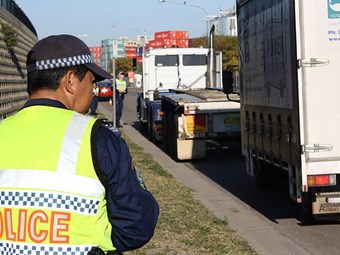NSW RMS Wants Industry Cooperation instead of Court Cases
 The NSW Road Authority has expressed its desire to avoid court cases over Chain of Responsibility offences.
The NSW Road Authority has expressed its desire to avoid court cases over Chain of Responsibility offences.
The RMS says it would prefer cooperation from the industry rather than prosecution regarding CoR offences.
The RMS’ director of safety and compliance, Peter Wells said the authority would prefer to avoid legal action where possible, despite its reputation for “hounding” companies and clients.
The agency said it would prefer to work with CoR offenders and see them rectify the problems rather than having to embark on legal action against these offenders.
Mr Wells explained in an article on OwnerDriver.com.au that prosecuting a chain of responsibility case was more expensive and consumed more time, than just issuing improvement notices when a breach is detected.
Wells was speaking at last year’s Chain of Responsibility and Heavy Vehicle Safety Conference.
He went on to explain:
“The enforcement effort should be relatively modest and next effort. So by the time we have a team investigate, it’s relatively expensive. It takes a lot of time, we brief our various legal friends, so we’re off to court,” he says.
“It is a lot of time and money [and] it is heavy on the organisation, so we want to if at all possible to persuade people to abide by the law. So we try and put a lot of effort into advocacy and persuasion to have people clearly understand the rules.”
Also speaking at the conference was RMS General Manager of Compliance Operations, Paul Endycott who explained that the organisation had enjoyed much success issuing improvement notices. These notices detail the breach that needs to be addressed by the company or individual and for the most part, people were quick to comply.
Endycott explained:
“That gets us compliance very quickly, and working with companies has shown great changes that those companies have been able to implement and get on with it so they can spend their money where it needs to be spent – in compliance and improvements rather than courts,”
“We like to be able to engage senior executives of companies to inform them of what we have found and make them aware, which enables their managers and staff underneath to take corrective action. And we would rather be sitting and talking at a discussion table than, in many instances, at a bar table with barristers arguing it out in court, costing everybody a lot of money.”
On the speed limiter tampering issue, Wells warned that the RMS would take a much stricter stance.
He said speed limiter tampering was common a few years ago when the RMS first began to focus on it but since then the number of trucks with speed limiters that had been tampered with had declined, mostly due to the efforts of NSW Police and RMS opertions. He went on to state:
“We see it as a pretty evil practice because of the safety side, but also commercially you’re really stealing out of the pockets of someone that is operating honestly and is spending the actual time to drive to the legal limit. So it distorts the market in a very negative way.”


